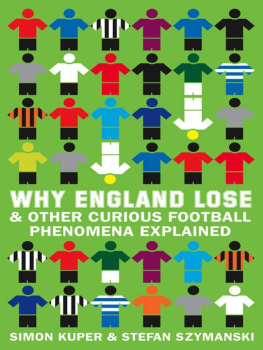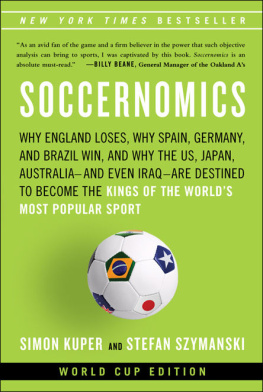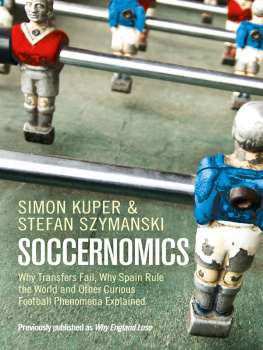Simon Kuper - Why England Lose & Other Curious Football Phenomena Explained
Here you can read online Simon Kuper - Why England Lose & Other Curious Football Phenomena Explained full text of the book (entire story) in english for free. Download pdf and epub, get meaning, cover and reviews about this ebook. publisher: Harper Collins Publishers, genre: Science. Description of the work, (preface) as well as reviews are available. Best literature library LitArk.com created for fans of good reading and offers a wide selection of genres:
Romance novel
Science fiction
Adventure
Detective
Science
History
Home and family
Prose
Art
Politics
Computer
Non-fiction
Religion
Business
Children
Humor
Choose a favorite category and find really read worthwhile books. Enjoy immersion in the world of imagination, feel the emotions of the characters or learn something new for yourself, make an fascinating discovery.
- Book:Why England Lose & Other Curious Football Phenomena Explained
- Author:
- Publisher:Harper Collins Publishers
- Genre:
- Rating:3 / 5
- Favourites:Add to favourites
- Your mark:
- 60
- 1
- 2
- 3
- 4
- 5
Why England Lose & Other Curious Football Phenomena Explained: summary, description and annotation
We offer to read an annotation, description, summary or preface (depends on what the author of the book "Why England Lose & Other Curious Football Phenomena Explained" wrote himself). If you haven't found the necessary information about the book — write in the comments, we will try to find it.
Why England Lose & Other Curious Football Phenomena Explained — read online for free the complete book (whole text) full work
Below is the text of the book, divided by pages. System saving the place of the last page read, allows you to conveniently read the book "Why England Lose & Other Curious Football Phenomena Explained" online for free, without having to search again every time where you left off. Put a bookmark, and you can go to the page where you finished reading at any time.
Font size:
Interval:
Bookmark:
WHY ENGLAND LOSE & OTHER CURIOUS FOOTBALL PHENOMENA EXPLAINED
SIMON KUPER & STEFAN SZYMANSKI

From Simon: To Pamela, who doesnt know about football, but knows about writing; for her astonishing tolerance. And to Leila, Leo and Joey, for many hundreds of smiles.
From Stefan: to my father. We never saw eye to eye, but he taught me to question everything.
Table of Contents
This book began in the Hilton in Istanbul. From the outside its a squat and brutalist place, but once the security men have checked your car for bombs and waved you through, the hotel is so soothing you never want to go home again. Having escaped the 13-million-person city, the only stress is over what to do next: a Turkish bath, a spot of tennis or yet more overeating while the sun sets over the Bosphorus? For aficionados, theres also a perfect view of the Besiktas football stadium right next door. And the staff are so friendly they are even friendlier than ordinary Turkish people.
The two authors of this book, Stefan Szymanski (a sports economist) and Simon Kuper (a journalist), met here. Fenerbahce football club was marking its centenary by staging the 100th Year Sports and Science Congress, and had flown them both in to give talks.
Simons talk was first. He said he had good news for Turkish football: as the countrys population mushroomed, and its economy grew, the national team was likely to keep getting better. Then it was Stefans turn. He too had good news for Turkey. As the countrys population mushroomed, and its economy grew, the national team was likely to keep getting better. All this may, incidentally, have been lost on the not very Anglophone audience.
The two of us had never met before Istanbul, but over beers in the Hilton bar we confirmed that we did indeed think much the same way about football. Stefan as an economist is trained to torture the data until they confessed, while Simon as a reporter tends to go around interviewing people, but those were just surface differences. We both think that much in football can be explained, even predicted, by studying data-especially data found outside football.
For a very long time football escaped the Enlightenment. Football clubs are still mostly run by people who do what they do because they have always done it that way. These people used to know that black players lacked bottle, and they therefore overpaid for mediocre white players. Today they discriminate against black managers, buy the wrong players, and then let those players take penalties the wrong way. (We can, incidentally, explain why Manchester United won the penalty shootout in the Champions League final in Moscow. Its a story involving a secret note, a Basque economist, and Edwin van der Sars powers of detection.)
Entrepreneurs who dip into football also keep making the same mistakes. They buy clubs promising to run them like a business, and disappear a few seasons later amid the same public derision as the previous lot. Fans and journalists arent blameless either. Many newspaper headlines rest on false premises: Newcastle Land World Cup Star, or World Cup Will Be Economic Bonanza. The game is full of unexamined clichs: Football is becoming boring because the big clubs always win, Football is big business, and, perhaps the greatest myth in the English game, The England team should do better. None of these shibboleths has been tested against the data.
Most male team sports are pervaded by the same overreliance on traditional beliefs. American baseball, too, was until very recently an old game filled with old lore. Since forever players had stolen bases, hit sacrifice bunts, and been judged on their batting averages. Everyone in baseball just knew that all this was right.
But that was before Bill James. Like Dorothy in The Wizard of Oz , James came out of rural Kansas. He hadnt done much in life beyond keeping the stats in the local Little League, and watching the furnaces in a pork-and-beans factory. However, in his spare time he had begun to study baseball statistics with a fresh eye, and discovered that a great portion of the sports traditional knowledge is ridiculous hokum. James wrote that he wanted to approach the subject of baseball with the same kind of intellectual rigor and discipline that is routinely applied, by scientists great and poor, to trying to unravel the mysteries of the universe, of society, of the human mind, or of the price of burlap in Des Moines.
In self-published mimeographs masquerading as books, the first of which sold 75 copies, James began demolishing the games myths. He found, for instance, that the most important statistic in batting was the rarely mentioned on-base percentage-how often a player managed to get on base. James and his followers (statisticians of baseball who came to be known as sabermetricians) showed that good old sacrifice bunts and base-stealing were terrible strategies.
His annual Baseball Abstracts turned into real books; eventually they reached the bestseller lists. One year, the cover picture showed an ape, posed as Rodins The Thinker , studying a baseball. As James wrote in one Abstract : This is outside baseball. This is a book about what baseball looks like if you step back from it and study it intensely and minutely, but from a distance.
Some Jamesians began to penetrate professional baseball. One of them, Billy Beane, the bafflingly successful general manager of the little Oakland As, is the hero of Michael Lewiss earth-moving book Moneyball . (Well say more later about Beanes brilliant gaming of the transfer market and its lessons for football.)
Eventually even the people inside baseball started to get curious about James. In 2002 the Boston Red Sox actually appointed him Senior Baseball Operations Adviser, his first regular job since the pork-and-beans plant. That same year, the Red Sox hired one of Jamess followers, the 28-year-old Theo Epstein, as the youngest general manager in the history of the major leagues. In 2004 the cursed club won its first World Series in 86 years. In 2007 they won another.
In 2006 Time magazine named James in its hundred most influential people in the world. Now football is due its own Jamesian revolution.
A NUMBERS GAME
Its strange that football has been so averse to studying data, because one thing that attracts many fans to the game is precisely a love of numbers.
The man to ask about that is Alex Bellos. He wrote the magnificent book Futebol: The Brazilian Way of Life , but he also has a maths degree, and his The Book of Numbers: Everything You Need to Know about Simple Math was due to appear at about the same time as Why England Lose .
Numbers are incredibly satisfying, Bellos tells us. The world has no order, and maths is a way of seeing it in an order. League tables have an order. And the calculations you need to do for them are so simple: its nothing more than your three times table.
Though most fans would probably deny it, a love of football is often intertwined with a love of numbers. There are the match results, the famous dates, and the special joy of sitting in a pub with the newspaper on a Sunday morning reading the league table. Fantasy Football Leagues are, at bottom, numbers games. And James Alexander Gordons incantation of the British football results on Saturday afternoons (Cow-den-BEATH 1, Sten-house-MUIR [pause] 1) is part timeless ritual, part romance of place names, and part poem of numbers.
In this book we want to introduce new numbers and new ideas to football: numbers on suicides, on wage spending, on countries populations, on anything that helps to reveal new truths about the game. Though Stefan is a sports economist, this is not a book about money. The point of football clubs is not to turn a profit (which is fortunate, as almost none of them does) and nor are we particularly interested in any profits they happen to make. Rather, we want to use an economists skills (plus a little geography, psychology and sociology) to understand the game on the pitch, and the fans off it.
Next pageFont size:
Interval:
Bookmark:
Similar books «Why England Lose & Other Curious Football Phenomena Explained»
Look at similar books to Why England Lose & Other Curious Football Phenomena Explained. We have selected literature similar in name and meaning in the hope of providing readers with more options to find new, interesting, not yet read works.
Discussion, reviews of the book Why England Lose & Other Curious Football Phenomena Explained and just readers' own opinions. Leave your comments, write what you think about the work, its meaning or the main characters. Specify what exactly you liked and what you didn't like, and why you think so.











